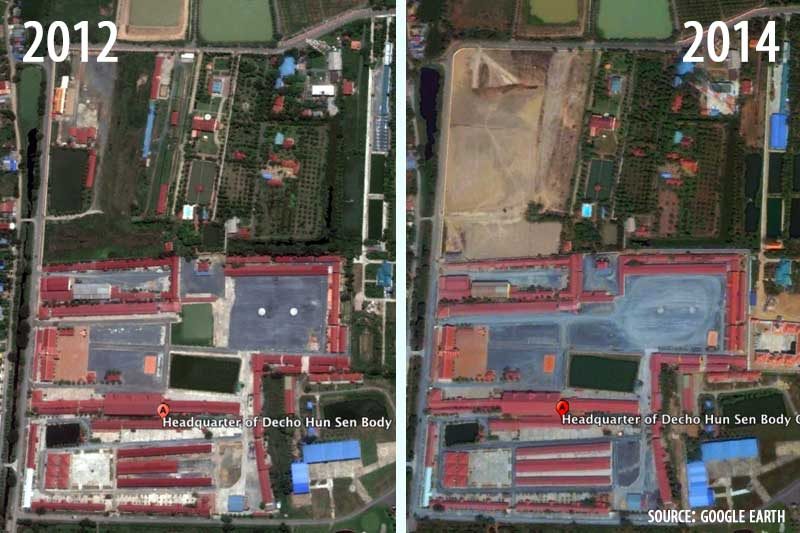A document leaked on Wednesday links Lim Kean Hor, minister of water resources and meteorology, to more than $330,000 worth of infill work done at the Kandal province compound of Prime Minister Hun Sen’s personal bodyguard unit, with Mr. Kean Hor’s efforts, if not the dollar amount attached to them, confirmed by senior members of the unit.
A report dated April 9, 2014, and posted on Wednesday on the Facebook page Thleay, or “leaks,” appears to show Mr. Kean Hor updating Mr. Hun Sen and his wife Bun Rany on infilling work he completed that year at the Toul Krasang bodyguard camp in Takhmao City, which is said to host hundreds of troops loyal to the prime minister.

“To comply with the high advice of…Bun Rany Hun Sen, I assigned a technical working group and some machinery to transport dirt to infill a plot of land at Toul Krasang bodyguard camp,” the note says, using Ms. Rany’s full name.
“I would like to pay all expenses,” it says.
Neither Mr. Kean Hor nor a Council of Ministers spokesman could be reached to confirm the authenticity of the document, which was posted on a page that has dumped a number of unflattering photographs, documents and other material related to the prime minister and his family.
However, Ya Touch, a spokesman for the prime minister’s elite bodyguard unit, confirmed that Mr. Kean Hor had contributed to the infill work.
“He helped lots of things, especially on infilling dirt here,” he said.
The spokesman said he was not sure how Mr. Kean Hor had financed the work—whether he had possibly dipped into ministry coffers or paid for it himself.
“I am not sure whether it was his own money or not,” he said, declining further comment.
Hing Bun Heang, head of the unit, also confirmed the work took place, but referred further questions to the minister.
“Please ask him whether he spent his own money,” he said.
If the document is accurate, Mr. Kean Hor’s workers hauled and leveled 23,487 truckloads of dirt totaling 234,870 cubic meters from 2013 to 2014. The pricetag on the project was put at $337,079.
Satellite imagery from Google Earth shows what was in 2012 a green plot of land directly northwest of the area labeled as the bodyguard compound transforming into a barren splotch of brown by 2014.
San Chey, country director of the NGO Affiliated Network for Social Accountability, said the financing appeared to be more of an ethical question than a legal one—at least if the money came directly from Mr. Kean Hor personally.
“However, the National Audit Authority should check the ministry’s budget whether it was really not used by the minister for that case,” he wrote in an email.
Sorpong Peou, a professor of international security in Sophia University in Tokyo, in his 2000 book “Intervention and Change in Cambodia: Towards Democracy?,” said the compound was believed to serve as a base for between 1,000 and 1,400 troops as well as Russian-made military trucks, tanks, armored personnel vehicles and a helicopter.
In June 2009, the compound was rocked by a series of explosions that left two injured and officials tightlipped. A local village chief told reporters that the explosion occurred as two truck drivers refueled a truck filled with B-40 rockets that was headed from the base to Cambodia’s disputed border with Thailand in Preah Vihear province.
Mr. Hun Sen’s bodyguard unit grew from a roughly 60-man security detail in the mid-1990s into groups of specialized, loyalist forces that together rival in size the national militaries of Senegal, Somalia, or Zambia, and are key to the prime minister’s hold on power, according to political scientist Lee Morgenbesser, of Australia’s Griffith University, in a paper published in February.
Mr. Kean Hor was last swept up in scandal in 2007, when he told the National Assembly that Australian mining company BHP paid $2.5 million in “tea money”—a colloquial phrase for bribes—to the government to secure exploration rights in northeast Cambodia.
Mr. Kean Hor told parliament that the prime minister had called him from Australia and urged him to use the money to immediately get started on a $2 million irrigation project in Pursat province.
“Samdech Prime Minister was really happy,” he said.




